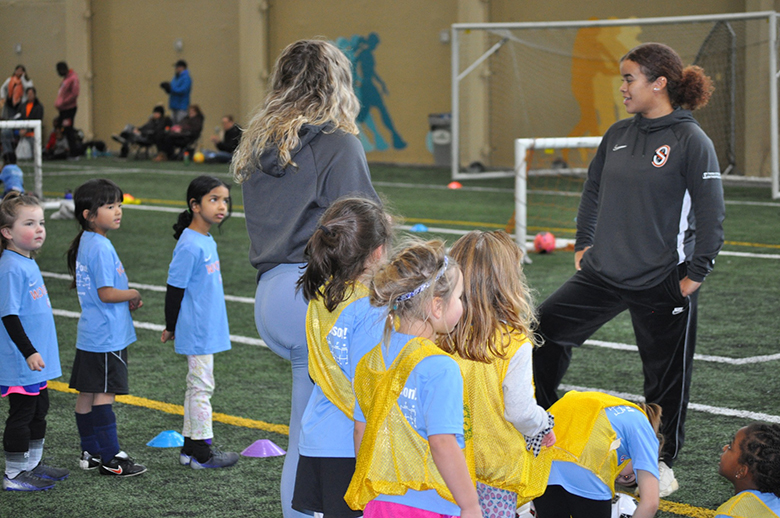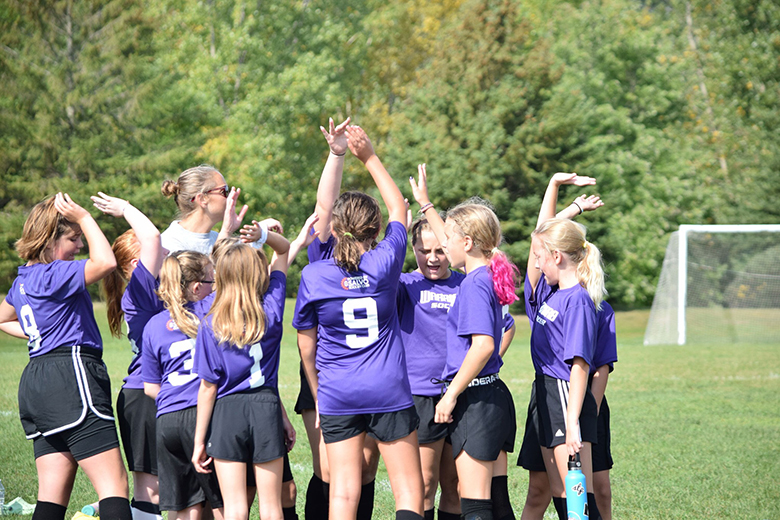Top 5 Tips for Soccer Success: Insights From Our Club

Youth soccer serves as a strong foundation for a lifelong journey in sports and offers numerous benefits, including physical fitness, social interaction, and the development of important life skills.
For many young athletes, soccer represents teamwork, skill mastery, and a joyful pursuit of excellence. Yet, success in soccer is not guaranteed; It requires dedication, education, and a multifaceted approach that balances physical, mental, and nutritional aspects.
The insights shared here by the Salvo SC staff aim to arm parents and young players with the tools they need to grow not only as athletes but also as individuals.
1. Proper Training & Conditioning
The foundation of any successful soccer player is a robust training program. While Salvo SC does everything we can to help every athlete improve, simply coming to practices and games is often not enough to encourage the full growth and potential of young players.
No matter the age of the player, parents should help foster a practice routine that is both fun and beneficial for their athlete.
The Importance of Regular Soccer Practice
Consistency in practice is key. Young players should participate in drills that focus on ball control, passing, shooting, and defending. Regular practice helps in the development of muscle memory, so movements and skills become second nature on the field.
Depending on how many practices a week your player attends, you may want to supplement more practice at home. Try running dribbling drills in your backyard with your player, or set up a goal to focus on shooting.
The more you can encourage your young soccer player to practice and have fun practicing, the more likely they’ll stick with it and see their own improvements.

Focus On Skill Development
A player’s skill set is their most valuable asset. Coaches and parents should encourage practice beyond team sessions, supporting the constant honing of their craft.
Dribbling through cones, juggling the ball, and working on quick feet are valuable exercises that can be done anywhere.
Incorporate Strength & Conditioning Exercises
Balancing endurance with strength is crucial in soccer. For your young athletes, you may want to encourage them to try other sports and activities, like swimming and biking, because many types of physical activity build on each other and develop endurance and strength that help them on the soccer field.
As your player gets older, you should help them take advantage of youth-age-appropriate exercises such as bodyweight squats, lunges, and plyometric drills to help develop agility, strength, and overall physical fitness.
Our coaching staff and Training Haus partnership can help players create workout regimens that support their strength and conditioning goals.
2. Mental Preparation
While physical preparedness is an obvious key to soccer success, the psychological aspect of the game can often be the differentiator during intense matches. Parents, coaches, and players should take a little time to understand mindfulness and how to mentally prepare for games.
Set Goals & Stay Motivated
Help young athletes set short-term and long-term goals and ensure they celebrate the small victories. While a long-term goal might be to win the next tournament, those short-term goals are what have the power to make the big goal happen.
Short-term goals should be personal and tied to your individual player’s performance. Some examples could be passing the ball 10 times in one game, dribbling the ball all the way down the field without losing it out of bounds, stealing the ball from an opposing player twice, or scoring a goal.
No matter the age or level of your player, staying motivated through setting milestones can significantly help maintain their focus and drive.

Develop Mental Toughness
Soccer can be a physically and mentally demanding sport. Teaching young players to endure challenges, stay focused, and be resilient is invaluable for their soccer journey and personal development.
Sometimes those short or long-term goals won’t be met. Remind your player that it’s OK. That’s what happens in life sometimes. The more important thing is to keep going and try again. That is where they can find fulfillment and continual love for the sport.
Manage Performance Anxiety
Anxiety before a match is normal. Encouraging relaxation techniques and positive self-talk can help players manage their nerves and perform to the best of their abilities.
Help your young athlete develop a personalized pre-game routine that calms some of those jitters, like doing some jumping jacks and ball juggling or letting them sit comfortably and listen to music. Give them space to find their calm.
3. Nutrition & Hydration
A well-rounded athlete is not complete without a keen understanding of nutrition and what foods work best for their body. Plus, proper fueling can enhance performance and aid in recovery.
The Importance of a Balanced Diet
Encourage your player to eat a balanced diet rich in complex carbohydrates, lean proteins, and healthy fats. Young athletes require these nutrients to support their growth and energy needs.
Hydration Guidelines for Young Athletes
Dehydration can lead to a decrease in performance and pose health risks. Ensure young players understand the importance of drinking water before, during, and after training and games.
Pre & Post-Game Meal Recommendations
Pre-game meals should be high in carbohydrates with moderate protein content. Post-game, focus on replenishing lost fluids, electrolytes, and muscle glycogen with a meal or snack rich in both carbohydrates and protein.
4. Injury Prevention & Recovery
An injured player is a sidelined player. Learn about warm-up strategies, the power of recovery, and swift responses to injuries.
Warm-Up & Stretching Routines
Many injuries, like pulled hamstrings or strained tendons, can be prevented simply by stretching and warming up muscles. Prior to each practice and match, a thorough warm-up and stretching routine should be in place.
Focus on dynamic stretches that mimic on-field movements to prepare the body.
The Importance of Rest & Recovery
Young athletes must understand the importance of rest days and prioritizing sleep. Coaches and parents need to work together to encourage their young athletes to respect their bodies and rest, especially after physically taxing games and practices.
Recovery helps the body repair and adapt to the physical demands of training and matches.
Recognizing & Addressing Injuries Promptly
In the event of an injury, it’s essential to seek medical attention promptly. Delaying treatment can lead to longer recovery times and even more severe injuries.
As your player progresses through our programs, you’ll notice more trained staff ready to help address player injuries at games and practices. This is because we take player safety very seriously.
5. Teamwork & Communication
Soccer is a team sport, and success on the field is dependent on effective teamwork and communication. Exploring and understanding the nuances of working with others to achieve common goals is a critical component of life in general, so helping young athletes develop these skills is a paramount part of our role at Salvo SC.
Understand the Importance of Teamwork in Soccer
Part of our club’s goal and our current parents’ hope is to instill in young players the significance of teamwork. No one player wins a game – the team does.
Support, respect, and cooperation are fundamental at all levels. Succeeding in soccer comes down to how well the team can work together.
Effective Communication On & Off the Field
Communication is the invisible thread that ties a team together. Our coaches teach the value of clear instructions, encouragement, and supportive interactions with teammates.
That practice can be reinforced at home for even stronger development and to become a part of how your player participates in their home, school, and community.

Build Positive Relationships With Teammates & Coaches
Creating a positive team dynamic is essential. Young athletes should cultivate relationships based on trust, support, and shared goals with their teammates and coaches. Experiencing this dynamic on the soccer field helps players create better relationships with people off the field, too.
Remember: Soccer success is not just about the trophies won or the games played; It’s about the lessons learned, the friendships made, and the memories created.
Start Your Soccer Journey With Salvo SC
Encourage open dialogue with your young athlete, set goals together, and commit to the disciplines that foster excellence. With the right strategies and a well-rounded approach, your child can enjoy a successful and rewarding experience in the world of youth soccer!
To start or continue your soccer learning journey, Salvo SC offers a wide range of helpful resources and training programs for girls and boys of all ages.
Whether you’re looking to enhance your soccer skills on a High Performance team or seeking a space to play recreationally, our club is the partner you need to achieve soccer success!
Connect with our dedicated coaches and staff anytime to learn more about how your soccer player can join our teams and make the most out of their soccer playing experience.